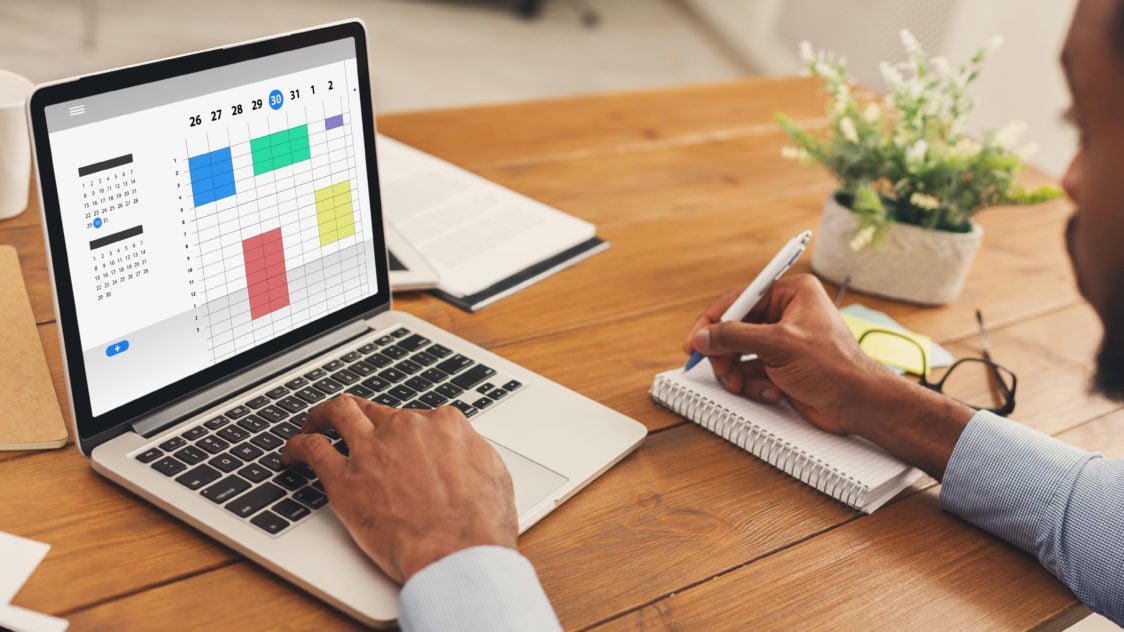Table of Contents
Spreading your daily energy allocation, motivation, time and willpower evenly over work activities and leisure time can be quite a challenge for ambitious individuals. This is all the more challenging at a time when a lot of people work from home and have non-stop access to work thanks to a laptop or mobile. They can work from almost anywhere, and instead of the classic eight hours, they spend twelve hours quietly working away. For example, they can be driven by their own workaholism, visions of career growth, money earned, or a demanding boss who requires results and more work overall.
Despite all the overtime, the sleepless nights and the constant thinking about work, you may have forgotten about your personal life. It deserves your care and attention, too. You may even lose your friends or partner due to an excessive workload, and also experience the negative consequences of constant work on your own health.
Therefore, it is important to take care of your work-life balance, i.e. a balanced work and personal life. If you set it right, you’ll end up happier in all respects. Start with prioritization, planning and other necessary steps, which we will discuss together in turn in this article.
What does work-life balance mean?
Work-life balance can mean something different to each of you. This is a subjective sense of contentment in both your work and personal life.

- For some, it can mean that they have a great handle on all their work responsibilities while having enough time for all their hobbies, family and friends.
- For others, it is enough to fit in sporting activities and have a quality meal and sleep after work.
- Or others achieved satisfaction when they stopped dealing with work commitments while at home with their family.
- And others are happy to finally have free weekends because it makes them a lot more productive during the working week. [1]
You can think of a work-life balance as walking on a thin rope. There’s work on one side and personal life on the other. Whoever has a work-life balance in their little finger passes along the line with ease and confidence. But if someone devotes a long time to excessive energy at work and neglects their personal life, needs and hobbies, they definitely fall to one side. Then it’s only a matter of time before they fall completely into the abyss of total exhaustion and burnout syndrome.
But if you have long felt that you are not paying enough attention to your family, you are not able to keep up with your hobbies, or all your thoughts revolve around work for which you have already sacrificed not only tens of hours of sleep, but also achieving your dream body, and so perhaps the time has come to reassess your work-life balance.
A work-life balance can be disrupted by a number of factors. You may have recently changed jobs or been promoted, and you have more responsibilities and obligations with which responsibility rises. But the cause can also stem from your personal life. Perhaps you’ve recently acquired a home and are paying off a mortgage, or your family has grown and so you need to provide financially. It puts you under a lot of pressure and you work almost non-stop. But this is not the way to function indefinitely, and the negative side effects are certainly not worth it. [2]
Negative consequences of an unbalanced work-life balance
When we misalign forces between work and leisure, it can have a negative impact on health and in other aspects of life. What can a bad work-life balance cause?
1. Poorer work performance and less productivity
In the beginning, you may do well at work, even if you overlook rest and your personal needs, such as sleeping and spending time with people close to you. As they say, you sort of get used to everything. In time, however, you may experience fatigue, frustration, loss of motivation and the inability to continue like this. Productivity will decrease rapidly, and your work results will also suffer. [3-4]
2. Higher stress levels
In case there’s too much going on at work, you’re working overtime every day and you’re not having time to relax properly, you’ll probably be stressed constantly. Chronic stress then has a negative effect on immunity, which can manifest itself in more frequent illness and absence from work. [3]
3. Impaired mental health
Excessive work, overtime, lack of sleep and rest can also damage your mental health. This, for example, can increase the risk of depression and anxiety. [5]
4. Burnout syndrome
When work is a priority for you and you devote all your effort and energy to it, it can eventually lead to burnout syndrome. This then manifests itself by a lack of interest in work, lower productivity and chronic fatigue or mood changes. [4-5]

5. Poor sleep
With sleep, it is important to be mindful of its quality, but also its duration. If you can’t sleep for at least seven hours in the long run, or you’re still waking up because of stress, you’re probably having trouble sleeping. Hence, greater fatigue, lower concentration and productivity both at work and in your personal life. [5]
6. Overweight or obesity
If you don’t work physically like a construction worker, and sit and eat most of the time during the day, you’ll probably start to gain weight. Stress eating can also contribute to this, causing additional caloric excess and weight gain. All of this can lead to being overweight or obese, with many health problems such as diabetes, high blood pressure or joint problems. [5]
7. Decline in physical fitness
Sitting all day at a computer and lack of time for sport will take their toll in the form of poor physical fitness over time. A lady who has been retired for ten years with vitality suddenly starts to run ahead of you on the stairs, and you give up catching the tram ahead of time. [5]
8. Deterioration of interpersonal relationships
Relationships with those closest to you need care, and you shouldn’t take them for granted. If you turn down dinner with your friends for the umpteenth time, you probably won’t hear from them again. And even your tolerant partner may eventually run out of patience when you don’t have time for them night after night or avoid family celebrations due to work. [4]
9. Loss of hobbies and favourite activities
When you spend days and weekends at work, you are happy to sleep and eat at all. Sport, film watching and other popular activities only go so far. And that’s a huge shame because these activities are not only a source of fun and physical or mental rest. They also help with personal development, and may even prevent the deterioration of cognitive function that typically comes with age. [4, 6]
A heavy workload often leads to excessive stress. You can read more about its consequences in our article Why Is Stress Dangerous and How To Reduce It?
You might be interested in these products:
Benefits of a good work-life balance
In the case you manage to set the balance between your work and personal life, you can look forward to a number of benefits.
1. Better work productivity
For example, if you manage to spend the whole weekend with your family, during which you will rest your mind, then you’ll probably come back full of energy on Monday. This may translate into more work and better productivity overall. You can do more work in less time and everything will be much easier. [8]
2. More motivation and enthusiasm for work
If you can organize your work well, enjoy it, develop your skills and not have to sacrifice your personal life, you have a win. That’s the kind of job you’ll probably want to keep, which will translate into more motivation and enthusiasm for performing the duties assigned to you. [9]
3. Good workplace relations
Maintaining good relationships in the workplace is more important than it sounds. This is reflected in the overall work effort, the mood of the team and results. If you are happy with yourself, you can also expect better relations with colleagues and thus contribute to an even healthier workplace ecosystem. [9]
4. Preventing burnout syndrome
When you engage in a variety of activities in your spare time where you don’t think about work, you will draw new energy and motivation to keep working. In addition, this will help you develop in more ways than one, supporting your creativity and ability to bring new innovative ideas. [11]
5. Greater life satisfaction
When you have sufficient time and energy for a partner and family, personal development, maintaining mental and physical health, and at the same time growth at work, this will translate into a sense of overall life satisfaction. [9-11]

13 steps to improve your work-life balance
These tips for a better work-life balance will help you plan and organize your daily life better. Sometimes small changes are enough, but other times you need to make a radical change in your job. First and foremost, it is important to identify the reason why you feel dissatisfied in a particular area of life, and then start working on change. [12]
1. Learn to use time for work, hobbies and other activities effectively
Try writing down consciously for one week how much time you spent working, housekeeping, playing sport and other activities. For work, also calculate how much time you spend on productive activities, scrolling on social networks, chatting with colleagues, or perhaps ineffective thoughts. If you look at the result, you might immediately find a reason why you still feel dissatisfied. [12-14]
2. Plan all your activities in a calendar
Once you know how much time you’ll spend on everyday activities, you can start reorganizing. Write down how many hours a day (from, to) you need to spend productively working to keep up with all the deadlines. Then plan your hobbies, responsibilities and leisure time you want to spend on yourself. At that time, always try to focus only on what you have planned. But also remember to have 7-9 hours of sleep, enough time for meals and transportation. [14-15]
After you write it all down, you have an idea of what you want to achieve as best as possible. But expect this to not always go 100%. You don’t live in a bubble that protects you from unexpected situations at work or at home. [14-15]
3. Try optimising your job role
Maybe your low efficiency at work isn’t just about not being good at utilizing time effectively. What you’re working on also plays a role. You’ll probably agree that an interesting job is almost done by itself, and an uninteresting one often has to go through a cycle of endless procrastination. If you’ve discovered that your current job role isn’t very satisfying and you’d rather do something a little different, try discussing it with your supervisor. They may offer you a project or tasks that are more in line with your experience, skills, and interests. Or you discover a whole new job opportunity that gives you back your motivation and enthusiasm for the cause. [16]

4. Think through your goals and make gradual changes
Changes in daily routine are also associated with an adjustment of existing habits. For example, you will get used to a lightly adjusted sleep pattern, learn to meditate, play sports daily, or stop scrolling social networks every ten minutes. But don’t try to change everything from one day to the next. That might have the opposite effect because you’d probably get stressed about the fact that it’s too much for you. [16]
You’d better bet on making incremental changes and set yourself small goals. It is much easier to take a small step each day than one giant leap. You make these according to your own priorities. If your goal is to sleep longer, go to bed thirty minutes or an hour earlier than you are used to. Once you are comfortable with this change, you can follow up with the next one. [16]
If you are interested in what habits can improve your life, read our article Biohacking: 7 Tips That Will Improve Your Life In Every Way.
5. Use time for work and time off effectively
If all your responsibilities are coming at you like an avalanche, it’s time to stop and prioritize. First, answer questions about what is the most important in your work and personal life, and what tasks you can set aside for a while. Make a to-do list accordingly. First, attend to urgent matters and then proceed to the less urgent ones. Good planning gives you a sense of peace and confidence that you can keep up with it all. [12,16]

Focus on your leisure time too. Does watching shows for hours or playing computer games give you the respite you need after working behind a computer day after day?
Wouldn’t it be better to spend your spare time on other activities that will also benefit your physical health?
It’s enough to take a walk in the fresh air, work out with a friend or go to the pool or sauna. You will see that these activities will make you feel much better than if you spend the whole day sitting. [12,16]
Also, try to reduce multitasking. Doing everything at once will increase the risk of error, and eventually, you’ll have to go back to these tasks.
You’d better choose just one to which you give your full attention. This can also be stolen away by social networks and poorly organized work environment. So try to keep it clean and free of things that distract your train of thought.
And if your mobile phone is repeatedly asking for your attention, placed on the desk next to you so that it is appealing to read the news or see new photos on Instagram, you’d better keep it hidden in a drawer or on the other side of the room. [16-17]
6. Find something to help you manage stress better
Stress is, on some scale, a normal part of everyone’s life. You can reduce it by better time and priority planning, but you will never get rid of it entirely. Therefore, it is important to find a way to manage stress a little more easily and then function better in everyday life. In your daily schedule, be sure to plan activities to help you relax and get your mind off things. Something different works for everyone. Verified ways to combat stress include exercise, running, cold water therapy, taking a walk in the outdoors, or you could try reading a book or meditating. You also de-stress greatly when talking to your friends or spending time with your family. [18]
If you’re wondering why it’s important to manage stress well and how to maintain a positive attitude in life, read our article 12 Tips On How To Take A Positive Approach To Life Even In Difficult Life Situations.
7. Learn to say “NO”
You’re available anytime, and when someone asks you to do extra work, you don’t hesitate to take it? That may be another reason why you no longer know when you are working and when you have free time. Next time someone asks you to do something extra, take some time to think about it. Take a look at your calendar and see how you are situated during your time away from work. If you see that you have room to take something extra without any problem, feel free to do so. But if you can’t keep up with your next task and your own responsibilities are burning, don’t be afraid to refuse to help someone else and explain why. [19-20]
8. Set clear boundaries when working from home
Separating work and leisure time can be an even greater challenge in a place where you spend almost all day. But if you adopt a few rules, I’m sure you’ll make it. First and foremost, find a place at home where you will only undertake work. A table and chair in a quiet room are enough to keep you away from any distractions during the day. Then set your hours, which you will keep just as you would in a regular office. Let your partner, family members or roommates know that you are only working during this time. If they need something from you, you can help them best after that hours.
In the same spirit, build more rituals. In the morning, eat your breakfast in peace and dress as if for work. It may well be comfortable sweatpants and a T-shirt, but the aim is to use this outfit only during working hours. After you’ve done all your work duties, change into your home clothes. This will let you know that your work is done and you can now pursue hobbies, family and other matters in your personal life. [21-22]

9. Take breaks while you work
Do you feel guilty every time you want to take a lunch break or enjoy a coffee with a colleague? You certainly don’t have to. Dosing your breaks sensibly will improve your focus and productivity. You can try a few minutes of meditation, go outside for some fresh air, and if you’re working from home, feel free to pull out the exercise mat and stretch. You shouldn’t skip a long lunch break, either. It’ll give you a moment’s distance from the tasks you’re working on. You will then return to your desk with added energy and perhaps some new creative ideas for improvement. [23-24]
Besides sleep, one needs other forms of rest. How to really relax effectively, read our article What To Do If You Feel Tired After Sleeping? Focus On These Seven Alternative Types Of Rest.
10. Take a holiday
Even the most powerful Formula One engine doesn’t run 100 percent non-stop without stopping for a moment to refuel. Nor can one perform at maximum power and do a perfect job without a break to replenish energy. That’s why a holiday is so important. Thanks to this time off, you will be completely detached from everyday duties for a few days.

It will clear your head and you’ll come to different thoughts. Instead of dealing with demanding work tasks, it will suddenly be a pleasant change to decide which beach to hit today or whether you eat a salty or sweet breakfast, or both, or which hill in the mountains you will climb.
This will certainly rest parts of the brain that you use at work. Plus, you will get perspective on your life, and you might realize that you need to make a change in it to be more content.
Not only will you return from your holiday full of awesome experiences and in good spirits, but after your initial acclimatization, you’ll feel as if someone has injected new energy into your veins. [16,19]
What benefits does a holiday bring?
- better concentration
- more creative thinking
- lowers stress
- and greater productivity [25-26]
And you don’t have to go to Hawaii for that, more than a few days in a chalet in the mountains or a wellness stay with your family should do the trick.
11. Try apps to improve productivity
Offline or online tools in which you can create to-do sheets, write notes, or write in your calendar will help you plan. In turn, apps such as Forest or Pomodoro will make it easier for you to be productive and focused. In these, you typically set a short time span (20-30 minutes) during which you will devote yourself only to work. You can also try Freedom or LeechBlock, which will block social networks according to your chosen time span. Your full attention will then be paid to the task entrusted to you. You can make it faster without distractions, and then you can devote the time saved to family or hobbies. [27]
12. Assess your new routine after some time
After a few weeks or months of getting more comfortable with your new routine, assess whether you are happier now and if the regimen suits you in every way. If not, feel free to make other changes. It might take some time to find your ideal work-life balance. Be sure not to give up! [26]
13. Promote productivity and stress management with nootropics and adaptogens
Dietary supplements containing nootropics and adaptogens can positively affect your daily functioning at work and everyday life. They can boost brain function, such as memory or concentration, and help increase productivity and alertness. They also have a positive effect on mood, stress management and overall physical and psychological well-being. [28-29]
- Nootropics include, for example, GABA, DMAE, acetyl l-carnitine or l-theanine.
- Of the adaptogens, Rhodiola rosea, ashwagandha or cordyceps are the most popular.
- Lecithin or omega 3 is also a great aid for supporting cognitive function.
If you are interested in what other effects adaptogens have, read our article Adaptogens: Natural Substances That Help Manage Stress.

What should you remember?
If you want to live a happy life, you should do everything you can to achieve a work-life balance. Thanks to this you will generally be more productive, happier, healthier and reduce the risk of burnout syndrome. It will be a huge positive step in your personal life as well as in the quality of relationships with your loved ones.
This is best achieved through prioritization, planning and the overall management of your days. It is also beneficial to find activities that help you better manage stress and allow you to relax. When you start using your time in a more meaningful way, you will suddenly find that you can handle a lot more and it doesn’t cost you overtime and constantly having to explain why you can’t go away for the weekend again because of work.
Do you have anyone among your friends who works all the time and doesn’t have time for anything else? Share this article with them. Maybe it will open their eyes and thanks to these practical tips will help them find a work-life balance.
[1] Mental Health Foundation. Work-life balance. – https://www.mentalhealth.org.uk/a-to-z/w/work-life-balance
[2] BetterUp. 10 tips to improve your work-life balance. – https://www.betterup.com/blog/work-life-balance
[3] Capacity Blog. Consequences of Poor Work-Life Balance. – http://www.capacitytrust.com/blog/our-services/sustain/consequences-of-poor-work-life-balance/
[4] Murphy, N. How to improve your work-life balance. – https://cpdonline.co.uk/knowledge-base/business/improve-work-life-balance/
[5] Poor work-life balance leads to poor health later in life. – https://www.medicalnewstoday.com/articles/313755
[6] Center for Cognitive Health. Hobbies, Are They Really That Important? – http://www.centerforcognitivehealth.com/hobbies-are-they-really-that-important/
[7] Whalen, R. Here’s How to Spot Burnout in the Workplace (And What To Do About It). – https://info.totalwellnesshealth.com/blog/heres-how-to-spot-burnout-in-the-workplace-and-what-to-do-about-it
[8] Moulder, H., J.D., & ACC. 10 Reasons Why Work Life Balance Is Important (2021 Edition). – https://www.coursecorrectioncoaching.com/reasons-why-work-life-balance-is-important/
[9] Benefits of Healthy Work Life Balance. – https://www.managementstudyguide.com/benefits-of-healthy-work-life-balance.htm
[10] Digital Perks. Importance and Benefits of Work-Life Balance: Why, What and How . – https://www.digitalperks.co.uk/blog/importance-and-benefits-of-work-life-balance-why-what-and-how
[11] Powell, K. Work–life balance: Break or burn out. – https://doi.org/10.1038/nj7654-375a
[12] Lupu, I., & Ruiz-Castro, M. Work-Life Balance Is a Cycle, Not an Achievement. – https://hbr.org/2021/01/work-life-balance-is-a-cycle-not-an-achievement
[13] Practical Wisdom - Interesting Ideas. Work Life Balance—How to Balance Between Work and Your Personal life. – https://www.youtube.com/watch?v=BEhksY-DO1o
[14] Psychology Today. A Better Way to Think About Work-Life Balance.[https://www.psychologytoday.com/intl/blog/hovercraft-full-eels/202103/better-way-think-about-work-life-balance
[15] Nigel Marsh on Work-Life Balance—Sources of Insight. – https://sourcesofinsight.com/nigel-marsh-on-work-life-balance/
[16] ProofHub. The secret to work-life balance. – https://www.proofhub.com/articles/work-life-balance-tips
[17] Smokeball. How Multitasking Harms Your Work/Life Balance. – https://www.smokeball.com/blog/how-multitasking-harms-your-work-life-balance/
[18] Whalen, R. The Dangerous Link Between Overworked Employees and Their Health.– https://info.totalwellnesshealth.com/blog/the-dangerous-link-between-overworked-employees-and-their-health
[19] 8 Tips for a Better Work Life Balance. – https://www.oberlo.com/blog/work-life-balance
[20] Jeffries, S. Ten tips for a better work-life balance. – https://www.theguardian.com/lifeandstyle/2014/nov/07/ten-tips-for-a-better-work-life-balance
[21] John, S. I’ve been working from home for nearly a decade—Here are my top 9 productivity hacks to stay organized and avoid distractions.– https://www.businessinsider.com/work-from-home-productivity-hacks-2019-6
[22] The Simplicity Habit. The 6 Best Productivity Hacks When Working From Home. https://www.thesimplicityhabit.com/best-productivity-hacks-working-from-home/
[23] Kohll, A. New Study Shows Correlation Between Employee Engagement And The Long-Lost Lunch Break. – https://www.forbes.com/sites/alankohll/2018/05/29/new-study-shows-correlation-between-employee-engagement-and-the-long-lost-lunch-break/
[24] Gorvett, Z. The tiny breaks that ease your body and reboot your brain. – https://www.bbc.com/worklife/article/20190312-the-tiny-breaks-that-ease-your-body-and-reboot-your-brain
[25] Bloom, J. How do vacations affect workers’ health and well-being? Vacation (after-) effects and the role of vacation activities and experiences. – https://www.researchgate.net/publication/254897932_How_do_vacations_affect_workers'_health_and_well-being_Vacation_after-_effects_and_the_role_of_vacation_activities_and_experiences
[26] Psychology Today. Three Science-Based Reasons Vacations Boost Productivity .– https://www.psychologytoday.com/us/blog/feeling-it/201708/three-science-based-reasons-vacations-boost-productivity
[27] Peter. 19 Best Productivity Apps To Get Things Done In 2021. – https://hive.com/blog/productivity-apps/
[28] Scalco, D. 5 Science-Backed Nootropics For Better Focus & Productivity. – https://www.nutrasciencelabs.com/blog/5-science-backed-nootropics-for-better-focus-productivity
[29] Panossian, A., & Wikman, G. Effects of Adaptogens on the Central Nervous System and the Molecular Mechanisms Associated with Their Stress—Protective Activity. – https://doi.org/10.3390/ph3010188

